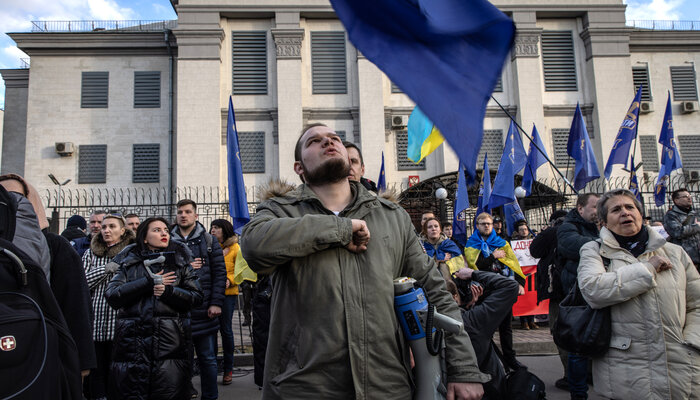Ukraine: The Stakes for Democracy
The war in Ukraine reminds us that our own democracy is worth fighting for.

You’re reading The Briefing, Michael Waldman’s weekly newsletter. Click here to receive it every week in your inbox.
We are all mesmerized, horrified, furious about Russia’s barbaric attack on Ukraine. The human toll, the wanton violence aimed at civilians, the 2 million refugees . . . the inspiring sight of ordinary people mobilizing to fight for their homes . . . all impel us to care so deeply.
Something else stirs our hearts, too: Ukraine is a democracy. Russia is a dictatorship. So the battle for Ukraine today is the frontline of the fight for democracy.
This broader conflict has been years in the making, though not always visible. Democratization swept the world in the late 1980s. In just a few years, Eastern Europe had nonviolent pro-democracy revolutions, the Soviet Union collapsed, Nelson Mandela was released from prison and elected president of South Africa. Even in China, a massacre in Tiananmen Square was required to preserve the regime. Liberal democracy, accompanied by free markets, seemed the wave of the future.
Democratization now faces a global backlash, a retrenchment. In Turkey, in India, in the Philippines, in Hungary and Poland, leaders were elected and revealed themselves to be autocrats. In China, Xi Jinping has hoarded the Communist Party’s power into his own hands.
For a decade, we watched Vladimir Putin stir trouble. He backed Brexit and threw his weight around in the French presidential election. And of course, in 2016 he intervened in our election, hacking Democratic emails to help elect Donald Trump. The president whom Putin backed, in the end, tried to overthrow American democracy.
It long seemed savvy to say that Putin simply wanted to sow chaos. In fact, he invariably backed authoritarian forces. They often spoke in the language of anti-immigrant nationalism and religious orthodoxy. Putin wasn’t just making trouble — he was waging an ideological war for right-wing social and political values.
It’s easy to forget that Putin’s help came as Trump removed support for Ukraine from the Republican platform in 2016. His campaign manager, Paul Manafort, was being paid by pro-Russian oligarchs. And Trump’s first impeachment was prompted by his corrupt bid to blackmail President Vlodymyr Zelensky, threatening to deny military aid unless the Ukrainian concocted smears against Joe Biden and his family. (I write about it in the journal Democracy in a review of Rep. Adam Schiff’s book.)
Ukraine is far from perfect. It’s corrupt and dominated by oligarchs. Like Russia it has a bloody ethnonationalist history. But when Ukraine — the country from which my family fled after anti-Semitic pogroms that killed tens of thousands — elected a Jewish president without batting an eye, it suggests something very different and very hopeful lives there.
If nothing else, the emotional outpouring for Ukraine can remind us of why we must fight for our own democracy. When Zelensky and his people talk about “freedom” and “democracy” they aren’t just spouting slogans. They are risking their lives. The images from Kyiv display the beauty and the power of a system based on the accumulated choices of millions of citizens, and why we must fight for it — and that fight is something we must wage here, in our own home, as well.





